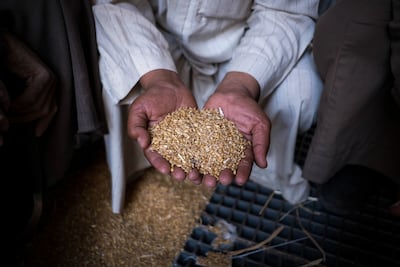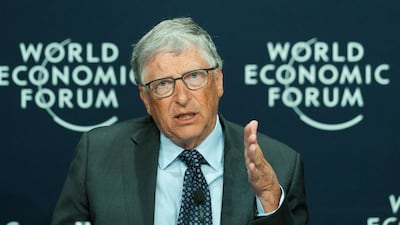In Davos last week, it was notable that two of the major announcements during the World Economic Forum’s annual meeting involved Bill Gates.
There was the news that a coalition of governments and private sector companies focused on decarbonising industry had expanded its membership and levels of funding. Also, a global health alliance had been formed to ensure that some of the most vulnerable populations, particularly in Africa, had access to medicines and vaccines.
At the news conferences for both initiatives, Mr Gates lent gravitas and star power. On his blog he is described as a “technologist, business leader, and philanthropist” but this belies the stature of a figure who is firmly positioned at the apex of the public consciousness. Such is his heft that he is frequently cited as the lynchpin of the more bizarre conspiracy theories doing the rounds on social media.
In Davos, Mr Gates was a hopeful but rational voice.
“Global health equity has made progress [but] we saw once again with Covid, we're not there. Whether it was getting the vaccines or now getting the therapeutics out, it's a lot of hard work,” warned Mr Gates, who established the eponymous foundation with his now ex-wife Melinda 22 years ago, during the launch of the pact with Pfizer and countries such as Rwanda and Malawi.
Mr Gates also conceded that the conflict in Ukraine meant that the world’s capacity to respond to crises was being stretched.
“In terms of resources for health … food, availability of fertiliser, the tragedy of the war goes far beyond the battlefield. And we'll see this year … the generosity of governments in terms of things like funding … budgets are incredibly stretched. The pandemic alone put us in that situation,” he said.
With the war, maintaining the momentum on health innovation and health improvement would be "a huge challenge", he pointed out.
"The pandemic was a setback. We have more malaria deaths now than we have three years ago, routine vaccination numbers went down a fair bit. So yes, there's a risk that in terms of resource trade-offs or even attention, that global health issues will get a lot less focus than they deserve, as we deal with so many challenges.”
Yet, despite the sobering analysis, Mr Gates’s presence in the room in Davos is expected to make an impact by way of bridging the gaps that he spoke about, whether in terms of awareness or funding.
Similarly, he has supported the Forum’s First Mover programme that encourages companies to decarbonise their supply chains and seeks to turn green hard to abate industries such as aviation, cement and steel.
Gates’s presence in the room in Davos is expected to make an impact by way of bridging the gaps that he spoke about, whether in terms of awareness or funding
During a news conference in Davos last week, John Kerry, the US special presidential envoy for climate, took a moment before anything else to thank Mr Gates. “Very important – thank you to Bill Gates, who is our primary implementation partner, and who helped from the very beginning to give this a sense of importance that it ought to have," Mr Kerry said.
Mr Gates himself said that solving climate change is "harder than any problem mankind has ever solved" because it involves "the entire physical economy”. But beyond such commitments, he is making the effort to tackle the problem by helping develop alternative and clean forms of energy. In November last year, for instance, TerraPower, a company he started, announced that it had chosen Kemmerer, Wyoming – historically a coal town – to build a sodium-cooled nuclear reactor.
“It is very promising in terms of the cost and safety advances," he said during a Reddit Q&A recently. "If things go well, a lot of these reactors will help solve climate change. Eventually we want reactors globally but the first ones will be in the US even though competing with natural gas electricity is hard here.”
Mr Gates has also written bestsellers, most recently How to avoid a climate disaster and How to prevent the next pandemic, to share what he has learned with as wide an audience as possible. And just so you realise he isn’t only about brain power, he has also been able to leap over a chair from a standing start, as he demonstrated during a TV interview in the mid-1990s. He says he still keeps fit by playing tennis.
There have no doubt been missteps in his career, such as his association with convicted sex offender Jeffrey Epstein. But he has admitted his mistake and has been unafraid to speak publicly about his painful divorce from Melinda.
Conversely, Elon Musk, another larger-than-life figure, seems to have little time for Mr Gates. He has repeatedly mocked him on social media and lately revealed that Mr Gates holds a huge short position in Tesla, the electric vehicle maker owned by Mr Musk, arguing that a bet against its shares dented the Microsoft founder’s climate credentials.
Mr Gates remains sanguine about the criticism from Mr Musk. “There’s no need for him to be nice to me,” he told the BBC recently.
That neatly sums up his approach, which sits in stark contrast to that of Mr Musk. The latter is determined to be a disrupter at all costs, seeing himself as both the problem and the solution to any issue, whether it is by aiming to improve Twitter or promoting the adoption of cryptocurrencies.
Mr Gates positions himself as part of the solution. By doing that he acts as a role model for other leaders in business and government, creating scale and momentum to meet our goals.
More from Armen Sarkissian
The Sheikh Zayed Future Energy Prize
This year’s winners of the US$4 million Sheikh Zayed Future Energy Prize will be recognised and rewarded in Abu Dhabi on January 15 as part of Abu Dhabi Sustainable Week, which runs in the capital from January 13 to 20.
From solutions to life-changing technologies, the aim is to discover innovative breakthroughs to create a new and sustainable energy future.
More from Neighbourhood Watch:
HAJJAN
%3Cp%3EDirector%3A%20Abu%20Bakr%20Shawky%C2%A0%3C%2Fp%3E%0A%3Cp%3E%3Cbr%3EStarring%3A%20Omar%20Alatawi%2C%20Tulin%20Essam%2C%20Ibrahim%20Al-Hasawi%C2%A0%3C%2Fp%3E%0A%3Cp%3E%3Cbr%3ERating%3A%204%2F5%3C%2Fp%3E%0A
STAR%20WARS%20JEDI%3A%20SURVIVOR
%3Cp%3E%3Cstrong%3EDeveloper%3A%3C%2Fstrong%3E%20Respawn%20Entertainment%3Cbr%3E%3Cstrong%3EPublisher%3A%3C%2Fstrong%3E%20Electronic%20Arts%3Cbr%3E%3Cstrong%3EConsoles%3A%3C%2Fstrong%3E%20PC%2C%20Playstation%205%2C%20Xbox%20Series%20X%20and%20S%3Cbr%3E%3Cstrong%3ERating%3A%3C%2Fstrong%3E%204%2F5%3C%2Fp%3E%0A
MOUNTAINHEAD REVIEW
Starring: Ramy Youssef, Steve Carell, Jason Schwartzman
Director: Jesse Armstrong
Rating: 3.5/5
MATCH INFO
Syria v Australia
2018 World Cup qualifying: Asia fourth round play-off first leg
Venue: Hang Jebat Stadium (Malacca, Malayisa)
Kick-off: Thursday, 4.30pm (UAE)
Watch: beIN Sports HD
* Second leg in Australia scheduled for October 10
Mercer, the investment consulting arm of US services company Marsh & McLennan, expects its wealth division to at least double its assets under management (AUM) in the Middle East as wealth in the region continues to grow despite economic headwinds, a company official said.
Mercer Wealth, which globally has $160 billion in AUM, plans to boost its AUM in the region to $2-$3bn in the next 2-3 years from the present $1bn, said Yasir AbuShaban, a Dubai-based principal with Mercer Wealth.
“Within the next two to three years, we are looking at reaching $2 to $3 billion as a conservative estimate and we do see an opportunity to do so,” said Mr AbuShaban.
Mercer does not directly make investments, but allocates clients’ money they have discretion to, to professional asset managers. They also provide advice to clients.
“We have buying power. We can negotiate on their (client’s) behalf with asset managers to provide them lower fees than they otherwise would have to get on their own,” he added.
Mercer Wealth’s clients include sovereign wealth funds, family offices, and insurance companies among others.
From its office in Dubai, Mercer also looks after Africa, India and Turkey, where they also see opportunity for growth.
Wealth creation in Middle East and Africa (MEA) grew 8.5 per cent to $8.1 trillion last year from $7.5tn in 2015, higher than last year’s global average of 6 per cent and the second-highest growth in a region after Asia-Pacific which grew 9.9 per cent, according to consultancy Boston Consulting Group (BCG). In the region, where wealth grew just 1.9 per cent in 2015 compared with 2014, a pickup in oil prices has helped in wealth generation.
BCG is forecasting MEA wealth will rise to $12tn by 2021, growing at an annual average of 8 per cent.
Drivers of wealth generation in the region will be split evenly between new wealth creation and growth of performance of existing assets, according to BCG.
Another general trend in the region is clients’ looking for a comprehensive approach to investing, according to Mr AbuShaban.
“Institutional investors or some of the families are seeing a slowdown in the available capital they have to invest and in that sense they are looking at optimizing the way they manage their portfolios and making sure they are not investing haphazardly and different parts of their investment are working together,” said Mr AbuShaban.
Some clients also have a higher appetite for risk, given the low interest-rate environment that does not provide enough yield for some institutional investors. These clients are keen to invest in illiquid assets, such as private equity and infrastructure.
“What we have seen is a desire for higher returns in what has been a low-return environment specifically in various fixed income or bonds,” he said.
“In this environment, we have seen a de facto increase in the risk that clients are taking in things like illiquid investments, private equity investments, infrastructure and private debt, those kind of investments were higher illiquidity results in incrementally higher returns.”
The Abu Dhabi Investment Authority, one of the largest sovereign wealth funds, said in its 2016 report that has gradually increased its exposure in direct private equity and private credit transactions, mainly in Asian markets and especially in China and India. The authority’s private equity department focused on structured equities owing to “their defensive characteristics.”
How to apply for a drone permit
- Individuals must register on UAE Drone app or website using their UAE Pass
- Add all their personal details, including name, nationality, passport number, Emiratis ID, email and phone number
- Upload the training certificate from a centre accredited by the GCAA
- Submit their request
What are the regulations?
- Fly it within visual line of sight
- Never over populated areas
- Ensure maximum flying height of 400 feet (122 metres) above ground level is not crossed
- Users must avoid flying over restricted areas listed on the UAE Drone app
- Only fly the drone during the day, and never at night
- Should have a live feed of the drone flight
- Drones must weigh 5 kg or less
KILLING OF QASSEM SULEIMANI



